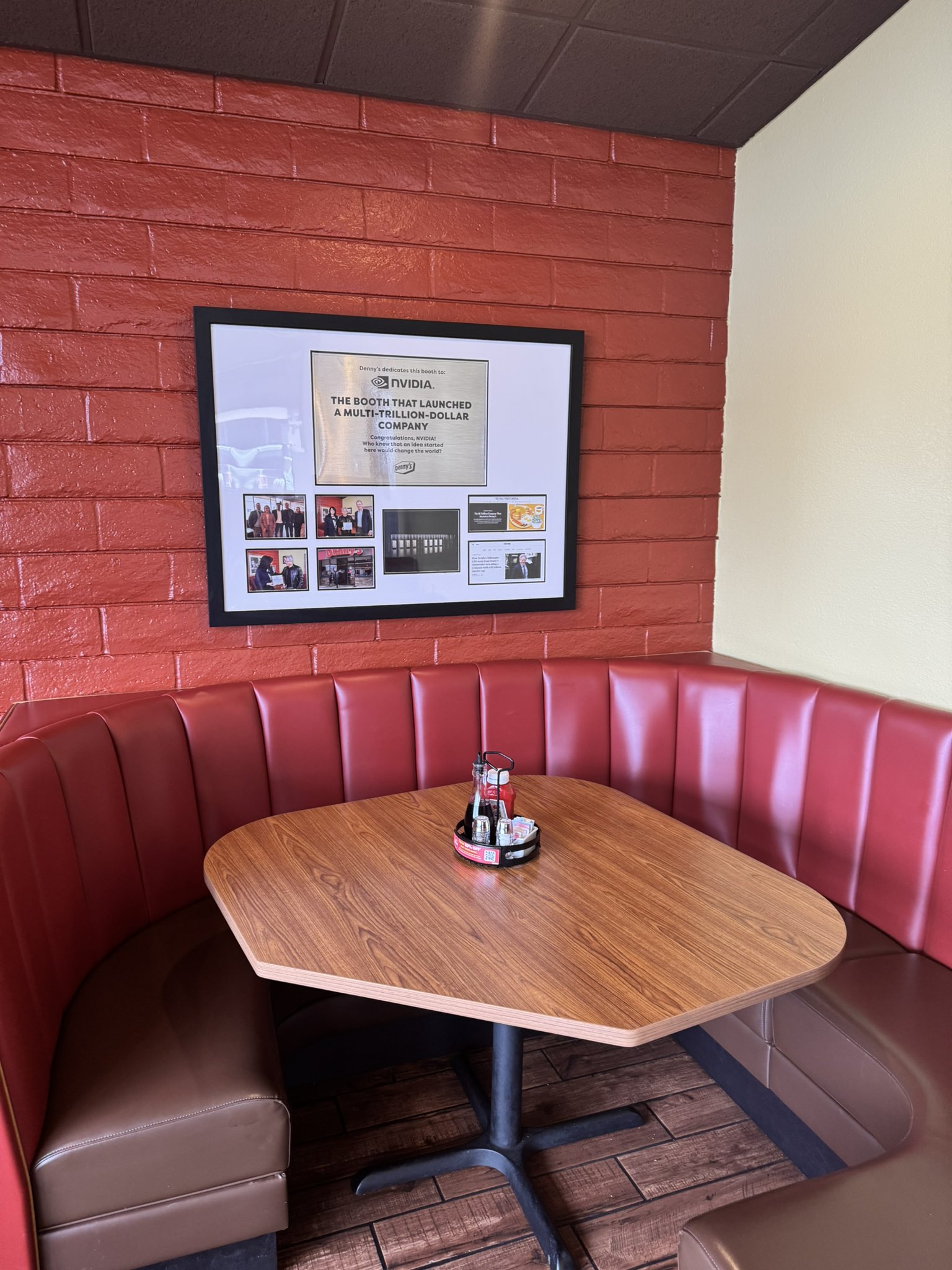Jensen Huang’s Humble Breakfast Booth Brainstorm Built the World’s Most Powerful AI Company.

The Denny’s booth where Nvidia’s business plan was sketched on napkins in 1993.
It’s the kind of story Silicon Valley dreams are made of—but rarely with this much maple syrup.
In 1993, three engineers sat in a Denny’s booth in East San Jose. With nothing but caffeine, conviction, and a few wrinkled dollar bills, they sketched out a plan that would quietly, then radically, reshape the future of computing.
One of them was Jensen Huang. A former dishwasher at that very same Denny’s. Today? He runs Nvidia, a $2 trillion juggernaut at the heart of the AI revolution.
No incubator. No pitch deck. Just pancakes.
The Power of Familiar Ground - Where Nvidia was Founded.
There’s something deeply poetic about Huang returning to the diner where he once scraped plates as a teenager. For many immigrant families—and Huang’s Taiwanese-American background is no exception—first jobs are rarely glamorous, but they’re formative.
He didn’t just work there. He absorbed the rhythm of the place. The clatter of dishes, the late-night thinkers, the unspoken promise that anyone could sit, stay, and dream.
“I worked at this Denny’s,” Huang told Forbes in 2023. “It felt like home. No one rushed us. It was the perfect incubator.” (Forbes)
That familiarity wasn’t just sentimental—it was strategic. He picked a place that welcomed underdogs. Somewhere quiet, cheap, and consistent. That kind of practical, people-smart thinking would define his leadership style for decades to come.
Napkins Became Business Plans.

Over pancakes and coffee, Nvidia’s founding team drafted the first business plans on diner napkins.
The idea was deceptively simple: build chips that could power real-time, 3D graphics for personal computers—especially gaming. No one else was doing it. Most believed it couldn’t be done.
Their first company name was NVision, but Huang floated a twist: Nvidia, drawn from “invidia”—Latin for envy. His co-founder Curtis Priem loved the subtle arrogance. They wanted competitors to turn green.
Naming a startup over pancakes might sound trivial. But here’s the insight: how a founder names their company often signals how they see the world. Nvidia wasn’t just a name. It was a statement. The ambition was baked in.
Real Risk. Real Grit - Nvidia Was Born!
They scraped together $600. Paid a lawyer in cash. Filed incorporation papers. And just like that—on April 5, 1993—Nvidia was real.
It’s easy to romanticize this moment, but let’s not skip over the stakes. Huang was 30, quitting a stable engineering career. His co-founders were all-in. There were no backup plans.
As Huang told Stanford’s Graduate School of Business, “We didn’t have much… but we had conviction—and pancakes.” (Stanford GSB)
That’s the thing about founding stories. They’re not just about capital—they’re about courage. When you’ve waited tables, betting your savings on a half-baked chip prototype feels oddly rational. You’ve already done hard things. What’s one more?
A CEO Made in a Booth.
Jensen Huang wasn’t the oldest or the most experienced of the three. But he had something rarer: relentless clarity. His co-founders saw it too.
“You’re in charge of running the company,” they told him.
It was more than a vote of confidence. It was a quiet transfer of belief.
“He had the kind of obsessive vision you need in a CEO,” Malachowsky said in an Nvidia anniversary profile. “He wasn’t just technical—he was stubborn in the best way.” (Nvidia Blog)
That stubbornness would prove vital. Especially during the years Nvidia nearly went bankrupt—twice. But Huang stuck to his instincts: invest in engineering talent, outpace competitors, and bet early on where the world will be.
When VC Smells Syrup and Scale
Eventually, venture capital came calling. Sequoia Capital founder Don Valentine saw something most investors missed: a team solving for a future problem before the market even realized it was a problem.
That early $2 million investment is now worth tens of billions.
As The Wall Street Journal noted, “Sequoia’s Nvidia stake may be the most successful VC bet of the AI era.” (WSJ)
But more important than the money was the validation. The booth-born idea had legs. And now, a runway.
From Syrup to Silicon Supremacy

From diner dreams to dominating AI—Nvidia now powers the world’s most advanced computing systems.
Fast-forward to today: Nvidia is behind nearly every major AI breakthrough of the decade. From autonomous vehicles to deep learning to generative models like ChatGPT—it’s Nvidia chips doing the heavy lifting.
Incredibly, that original Denny’s booth now bears a small plaque: “Where Nvidia Was Founded.”
Huang still visits. Still orders the Lumberjack Slam. Still says “we,” not “I.”
“Once Denny’s family, always Denny’s family,” a waitress once told him. He smiled. “Exactly.”
That humility? Not for show. It's a through line.
Huang’s signature move at keynotes? Giving his engineers the spotlight. The ones who stay up all night optimizing GPU pipelines. In an industry notorious for ego, his loyalty—and memory—run deep.
Pancakes and Possibility: Denny’s Joins the Legacy
Recognizing its unexpected place in startup folklore, Denny’s launched a Trillion Dollar Incubator—a contest that awards $25,000 for business ideas conceived at a Denny’s.
“Lightning might strike twice,” their CMO said in a release. “Jensen Huang proved that genius doesn’t need a boardroom—it needs a booth.” (Denny’s Media)
It’s clever marketing, yes—but also a fitting tribute to what matters in entrepreneurship: proximity, persistence, and pancakes.
Human Takeaway: More Than a Startup Story
Huang’s path from dishwasher to CEO isn’t just inspirational—it’s instructive.
-
Grit beats pedigree.
The best ideas aren’t always born in Ivy League dorms or tech accelerators. Sometimes, they’re written on napkins by people who’ve closed down diners after a double shift. -
Humility scales.
Huang didn’t forget his roots. And perhaps that’s why Nvidia didn’t forget how to lead with substance. -
Success isn’t always sexy.
Most founders chase spotlight. Huang chased solutions. The world eventually noticed.
Final Thought:
Next time you sip coffee in a corner booth, remember—someone once sat there sketching out the future. With sticky fingers and scrambled notes. Lightning doesn’t care where it strikes. But history seems to favor the ones who show up early, order the breakfast special, and dare to dream something big.
💡 People Also Ask
Where was Nvidia founded?
Nvidia was famously founded at a Denny’s restaurant in East San Jose, California, in 1993. Jensen Huang, Chris Malachowsky, and Curtis Priem met over coffee and pancakes to sketch out the company’s business plan on napkins. The exact booth is now marked with a plaque commemorating Nvidia’s origin.
Who is Jensen Huang and what is his net worth?
Jensen Huang is the co-founder and CEO of Nvidia. Born in Taiwan and raised in the U.S., Huang started his career as a dishwasher at Denny’s and rose to lead one of the most influential tech companies of the 21st century. As of mid-2025, his estimated net worth is over $70 billion, according to Bloomberg Billionaires Index.
Why did Nvidia choose the name "Nvidia"?
The name “Nvidia” comes from the Latin word invidia, meaning envy. Co-founder Curtis Priem wanted their competitors to “turn green with envy.” It was a cheeky nod to their ambition—and the name stuck.
Did Sequoia Capital invest in Nvidia early on?
Yes. Venture capital giant Sequoia Capital, led by Don Valentine, invested $2 million in Nvidia in its early stages. This investment is now considered one of the most lucrative bets in VC history, with a return valued in the tens of billions.
What does Jensen Huang still order at Denny’s?
Jensen Huang still visits the original Denny’s where Nvidia was born—and he still orders the Lumberjack Slam. It’s both nostalgic and symbolic: a nod to the startup hustle that fueled his vision.
Can you really start a business at Denny’s?
Technically, yes—and Denny’s is leaning into the lore. The company launched a “Trillion Dollar Incubator” contest, offering $25,000 for the next great idea developed inside one of their restaurants.
🔍 Interested in More Stories Like This?
If you're inspired by how Jensen Huang turned diner dreams into a tech empire, you're in the right place. At Finance Monthly, we dive deep into the bold decisions, humble beginnings, and billion-dollar pivots that shape the world’s most influential companies and leaders.
Wanting to read more success stories?
The Untold Story: How Pixar Turned Steve Jobs into a Billionaire!














